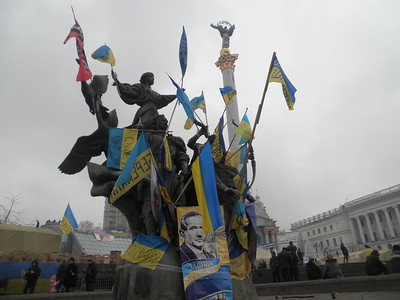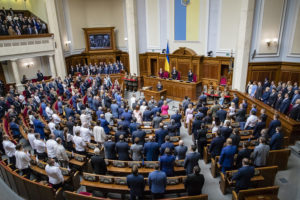 Independence Square, Kyiv, 12/19/2013. Courtesy: Jose Luis Orihuela via Flickr
Independence Square, Kyiv, 12/19/2013. Courtesy: Jose Luis Orihuela via Flickr
A New Electoral Mandate: Decentralization and Local Politics in Ukraine
On Sunday October 25, Ukrainians went to the polls in one of the most consequential elections in Ukrainian history: it was the first time since decentralization reform that Ukrainians participated in nation-wide local elections. Since 2015, Ukraine has undergone restructuring processes of decentralization and amalgamation, which has transferred more resources, capabilities, and responsibility to bodies of local self-government. Given that since 2015, considerably more power has been delegated to mayors and councilors, local citizenries will feel the effects of this weekend’s decisions in their day-to-day lives.
A New Type of Election, and with New Challenges
For the first time, citizens who have been internally displaced were able to vote in the elections where they live, enabling millions of internal migrants with the right to vote locally. This is especially poignant since the annexation of Crimea and the conflict in the Donbas have displaced some 1.5 million Ukrainians. In addition to voter enfranchisement, Sunday’s elections included a new mandatory gender quota meant to increase the range of representation in local politics.

“Anti-terrorist operation in eastern Ukraine (War Ukraine)” by Ministry of Defense of Ukraine, licensed under CC BY-SA 2.0.
Despite a new electoral system, the elections still faced unique challenges. Although decentralization could strengthen Ukraine’s defense against Russian hybrid warfare, Russian influence remained evident on election day. Due to Russian occupation in eastern Ukraine and Crimea, no elections were held in annexed Crimea, some districts of the Donbas region, or in occupied parts of the Luhansk and Donetsk oblasts. A new electoral system and the reminder of Russian occupation was in focus while public health concerns from the covid-19 pandemic lingered in the background.
A Referendum on Zelensky
The elections also marked the first nationwide local elections since the election of President Volodymyr Zelensky and the subsequent parliamentary elections that gave his party – the Servant of the People party – a plurality in Parliament and therefore a majority government. In 2019, Ukrainians elected Zelensky with more than 73 percent of the total ballots counted in the run-off vote, which meant a landslide victory over incumbent Petro Poroshenko, who received only 24 percent of the vote.
Even so, the president and his party have lost popular support at a rate which has alarmed observers and party leaders alike. In mid-September, a poll conducted by the Kyiv International Institute of Sociology (KIIS) showed that, “if the election of the President of Ukraine took place in mid-September,” only 31.8 percent of Ukrainians would vote for Zelensky. The poll showed that Petro Poroshenko would receive 18.9 percent of the vote, and Yuri Boyko would receive 13.3 percent. Considering Zelensky’s landslide victories in 2019, this recent polling shows a sharp decline in popular support for the president.

On May 20, 2019, newly elected President of Ukraine Volodymyr Zelensky was sworn in as Head of State. Courtesy of U.S. Embassy in Kyiv ,Ukraine, via Flickr.
The local elections were consequently an opportunity for opposition parties to exploit the declining momentum of the incumbent party. Decentralization reforms have increased mayoral budgets, therefore reducing local leaderships’ dependence on Kiev. Zelensky’s landslide victories last year focused on the nationwide agenda. Local problems, such as infrastructure and other day-to-day issues have largely been ignored. A poll conducted by the National Democratic Institute (NDI) in September 2020 suggests that the changes Ukrainians most expect from the local elections are infrastructure development, an increase in jobs, and improved municipal services. Now that local budgets have increased, candidates in Ukrainian cities can run on realistic local development and be held accountable with tangible results.
The Future of Ukraine, and Why it Matters
From the Euromaidan, to the election of Zelensky, and through election reform, Ukraine has insisted on democratization and distance from Russia. Despite this, Russia’s presence continues to overshadow Ukrainian sovereignty, and history warns about the instability of states in democratic transitions. Research from the NDI shows that democratization remains important to Ukrainians, and an election that produces a new climate of local, accountable governance could add momentum to this process.
Ukraine’s continued trajectory toward a more democratic, pro-European state will benefit the West’s posture against a revanchist Russia. But the local focus of October’s elections could fracture Ukraine’s domestic politics into competing regions: in the southeast, the popular pro-Russian Opposition Platform has focused on Zelensky’s failure to bring peace to the Donbas; in central and western parts of the country, Poroshenko’s party has accused the president of abandoning national interests. In this context, regional sentiments could challenge the country-wide successes of Zelensky’s party and forecast a different presidential and parliamentary makeup in the future.
Regardless of the challenges Zelensky faces, his party will still be able to form some local factions and maintain national power. But a loss in regional elections will promote a winter of discontent and position opposition parties to pressure the president going forward. Should local elites distance themselves from Kiev, and align closer to local office-holders, the momentum of Zelensky’s presidency – which is already slowing – will challenge his electoral mandate, and thus, could reshape the politics of Ukraine’s future.
Update (10/26/2020): Most of Sunday’s elections will require head-to-head runoffs in the coming weeks. Exit polls suggest that the nationwide local elections dealt a major setback for President Zelensky and his Servant of the People party. No candidate of the presidential party appears to have been elected mayor in any of the nine major cities and regional centers across Ukraine. Overall, the local parties of individual city mayors proved too strong to be challenged by national parties.





